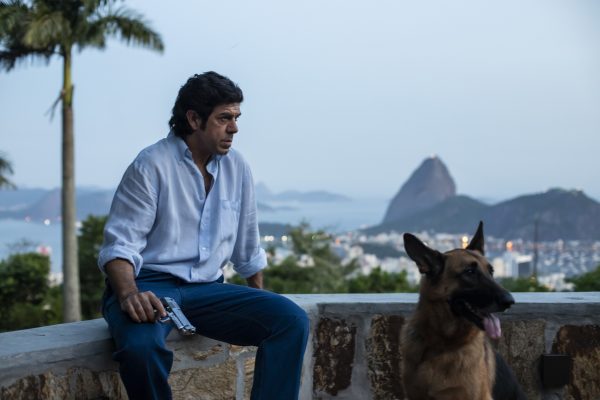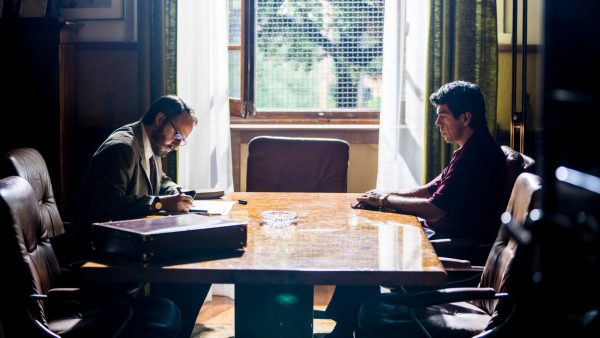Film Review: “The Traitor” — The Enigma of Betrayal
By Erica Abeel
What makes The Traitor ultimately worth watching is its epic sweep, the deft way director Marco Bellocchio and his below-the-credits team carve out the dramatic highlights of Italy’s twenty year war with the Cosa Nostra.
The Traitor directed by Marco Bellocchio. Currently screening at New York’s Film Form and Film at Lincoln Center. Coming to Cambridge’s Kendall Square Cinema on February 21.

Pierfrancesco Favino stars in Marco Bellocchio’s The Traitor.
The Traitor offers the odd distinction of being both bloated yet strangely compelling. This Mafia-centered film from venerable Italian auteur Marco Bellocchio pulls you through its running time of two-and-a-half hours with high drama, artful editing, and the tantalizing expectation that at some moment its point, its raison d’etre will break into the open. Alas, that moment remains elusive.
The film, Italy’s entry for the 2020 International Feature Film Oscar, spans 20 years in the real-life story of Tomasso Buscetta (Pierfrancesco Favino), the first Mafia informant in ’80s Sicily, who helped bring close to 500 mobsters to justice. Serving up reams of history and plenty of bloodshed, the narrative delves into the machinations of the Mafia as it dances around the reasons Buscetta, a Sicilian Don, decides to rat on his confreres. The Traitor kicks off in 1980, at a lavish party in Palermo where the rival clans are assembled. As a chilling aside, ominously rising numbers on the screen’s lower left tick off what we realize is a list of the whacked.
Buscetta decides to leave Palermo for Brazil with his third wife (Maria Fernanda Candido) and children to escape the escalating warfare between two clans, a conflict the heroin trade has turned increasingly ugly. But slipping his bonds to the Cosa Nostra proves to be an illusory business. Buscetta’s placid family life in a seaside villa is interrupted when he learns that back home his sons have been killed by ruthless crime boss Toto Riina (Nicola Cali).
Buscetta is arrested by the Brazilian police and tortured in rather ingenious fashion: he’s forced to watch as his wife is dangled over the sea from a helicopter. (Bellocchio, known for his sardonic musical sense, accompanies the scene with a peppy bossa nova on the soundtrack). Buscetta is extradited to Italy where, in exchange for witness protection, he makes a decision that will be crucial for the Mafia: he decides to meet with Judge Giovanni Falcone (Fausto Russo Alesi) and betray the eternal vow he made to the Cosa Nostra. The remaining bulk of the film recreates the circus-like courtroom scenes in which Buscetta snitches on the old gang while enclosed in a bullet-proof shield. His fellow mafiosi, locked in barred pens in the back, bellowed obscenely and generally acted out.

A scene from The Traitor.
The film’s most riveting scenes center on the back-and-forth between Buscetta and the somber Judge Falcone, perhaps because they nudge us toward—though never nail—Burchett’s motives in breaking ranks. Displaying a droll honor-among-thieves ethos, he claims he’s no “pentito,” but a principled man; in fact, he identifies as “an agricultural businessman.” Since both men are walking targets for the Mafia—”Death is always with us,” Falcone says—their exchanges, which verge on the intimate, exude a melancholy gravitas. Their scenes suggest the conviction, of a piece with the Italy of that period, that wives and children are all well and good, but it’s only men who truly understand each other.
What’s wanting in The Traitor is more insight into Buscetta. Small details are doled out. We know he’s vain; he’s caught boot-blacking his mustache in the rather well-appointed prison quarters where the state has housed its prize stoolie. He drops that he prefers bedding women to wielding power. In a scene that would be amusing if it weren’t also horrifying, a prison dorm is emptied out for Buscetta when he’s brought a local hooker. Before settling down to business, Buschetta, never a man without principle, pulls the bedclothes over a newly expired inmate. Otherwise, this antihero remains opaque, maybe by directorial intention. To judge by his lengthy filmography (which includes Vincere, based on the life of Mussolini’s first wife) Bellocchio has set out to explore the tumultuous history of modern Italy, but as seen through the eyes of conflicted characters with ambiguous motives.
The Traitor sometimes feels unfocused and overly packed with courtroom scenes—it requires sitzfleisch to stay the course. What ultimately makes the film worth watching is its epic sweep, the deft way Bellocchio and his below-the-credits team carve out the dramatic highlights of the 20-year war with the Cosa Nostra, darting back and forth in time and place, while guiding the viewer with titles that Mapquest you through the vast terrain. You sense you’re in the hands of master filmmakers, even while balking at the shattered windshields and arterial spray, and a sometimes numbing too-muchness.
Mainly, though, it’s the performance by Pierfrancesco Favino that makes Traitor sing (pun intended). His great beefy mug may not immediately draw you in, but the actor’s charisma and brooding allure become impossible to resist. American filmmakers rarely convey the sheer humanity of a character as Bellocchio does in the performance he’s drawn from Favino. Buscetta may be as down and dirty as his fellow mafiosi, guided by some mysterious code as he betrays everyone around him. Yet you end up rooting for this unknowable man struggling to outrun his past.
Erica Abeel is a novelist, film critic, and former professor at CUNY. Her journalism has appeared in major publications, including the New York Times and Indiewire. Wild Girls, her most recent novel, was praised by Oprah Magazine as a “libidinous period novel [that] follows three budding feminists through an elite women’s college, the New York art scene, and Allen Ginsberg’s bed, as they redefine womanhood for themselves and future generations.” She’s currently at work on a satirical novel about the women who launched second wave feminism, but couldn’t always live up to its ideals.
